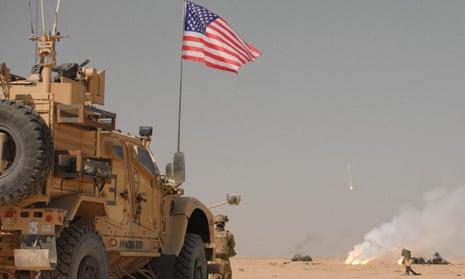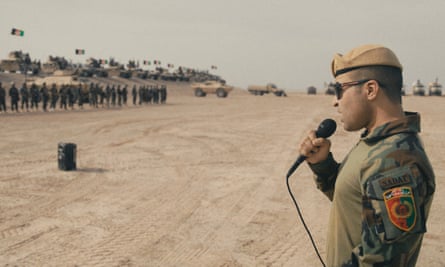David Smith in Washington
Acclaimed documentarian Matthew Heineman talks about his often devastating account of the US withdrawal from Afghanistan

Wearing a dark hijab and gripping the wire fence, a young Afghan woman shakes her head slightly, seemingly fights back tears, searches the faces of American soldiers, glances away pensively then looks back in anger, her eyes gleaming like black diamonds.
“She writes a novella for us in 36 seconds,” director Matthew Heineman says of the lingering shot that closes his documentary film Retrograde. “I’m curious what you interpreted in her face? To me it speaks volumes.”
The moment was captured in August last year at the airport in Kabul, Afghanistan, a day before 13 American service members and 170 Afghan civilians were killed there by an Islamic state suicide bomber following the US military’s chaotic withdrawal from the country.
Retrograde conjures an immersive look at the final nine months of America’s longest war through the eyes of one of the last US special forces units deployed there, a young Afghan general fighting a losing battle with the ever-encroaching Taliban, and civilians desperately trying to flee as the government collapsed.
The Oscar-nominated and Emmy award-winning Heineman had made films about citizen-journalists exposing the atrocities of Islamic State, vigilantes taking on Mexican drug cartels and frontline healthcare workers in one of New York’s hardest-hit hospitals at the start of the coronavirus pandemic.
But the bloody exodus through Kabul airport’s Abbey Gate shook even him. “Never in my life have I ever witnessed or experienced anything like that,” the 39-year-old reflects via Zoom from home in New York. “I’ve filmed a lot of sad things my career and certainly witnessed a lot of death in the past couple of years in the work that I’ve done.
“But that feeling of being at the Abbey Gate as thousands of Afghan civilians were packed like sardines in four-foot sewage ditch, as 18-year-old marines who weren’t even alive during 9/11 were making these impossible Sophie’s Choice decisions on who to let and who not to let in, as the Taliban was watching us at gunpoint a hundred yards away, as Isis [the Islamic State] was circling around us with suicide vests waiting to attack, it just was surreal and I had tears streaming down my face, continually having to wipe down the lens, and all I could think about was: what have we done?”
After years of trying to get permission, he and his small team embedded with the Green Berets with the initial intention of giving the world an insight into that special forces unit as it fought what had become a largely forgotten war.
Heineman explains: “What I try to do is take these large, amorphous subjects that we’re inundated with stats and headlines and, in some cases, misinformation [about] and try to humanise them, try to put a human face to them, and that’s certainly what I tried to do here. These conflicts can feel so far away and distant and I feel like it’s my job to make them feel immediate, to create an empathetic connection between the audience and these issues that feel so distant and so far away.
“And also to make you feel what it’s like to be there, what it’s like to be a two star general in the Afghan army staving off the Taliban, a US soldier leaving a conflict that you’ve been deployed in countless times and lost numerous friends in, in a Blackhawk helicopter as you’re being shot at by the Taliban. My goal is to put you in these rooms, in these places to make you think, ‘What would I do if I was there?’ or ‘What if that was my brother, my cousin or my sister or my mother?’
He adds: “I do it without context, without interviews. There’s no intent or execution of how we got here or what went wrong, which is obviously very intentional and I get criticised for that but I don’t feel like that’s my job. There’s a lot of other people doing that. My job is to give you a sort of visceral, emotional window into these conflicts in a way that I think ‘traditional media’ isn’t able to do (it’s not a talent thing: I have the luxury of time to be able to sit with a story for months or years).”
Soon it became apparent that tectonic geopolitical plates were moving beneath Heineman’s feet. In April 2021, Biden announced the withdrawal of all US troops from Afghanistan. In July, he denied it would be a repeat of the debacle of Vietnam: “There’s going to be no circumstance where you see people being lifted off the roof of a[n] embassy of the United States from Afghanistan,” he told a press conference. “It is not at all comparable.”
Meanwhile the 12-person Green Beret team that Heineman and his team were embedded with were forced to begin to “retrograde” – shipping out or destroying equipment, pulling out and going home. Or as one soldier puts it: “Retrograde means you’re shitting in a trench. That’s just what it is.”
In one of the film’s most poignant scenes, the Green Berets have to break the news to their Afghan comrades – sitting cross-legged and barefooted – that, after 20 years of fighting, nation building and promises, America is done with their homeland.

A bearded American soldier says: “It’s with a little bit of a heavy heart that I have to tell you this but we’re going to be leaving Afghanistan pretty soon.” His voice catching with emotion, he thanks the despondent men and adds: “I want all of you guys to know we were blindsided with this news very, very recently.”
Looking distraught, an Afghan points out that if he and his compatriots go back to civilian life or work for the Afghan government, none of them will be safe. His own house has been targeted twice already. The man plays some traditional music and the sound is joyful but the expressions of his comrades – Afghan and American – is anything but. Their faces are written with loss.
Heineman comments: “That’s why I love making films this way. Faces never lie and there’s a reason why we hold on faces for so long in this film. It wasn’t just a trick we figured out in the edit room; it was a real methodology of shooting.
“The Green Beret faces, the Afghan faces in that scene spoke more than any 30-minute, two-hour, six-hour interview could ever speak. A feeling on the American side of abandonment, leaving these friends a friendship and a bond that they developed over years or decades; a partnership. They felt like they’re leaving their brothers behind with their arms tied behind their back.
“And then, obviously, on the Afghan side a feeling of of trepidation of what this meant for their personal future, their personal safety, the safety of their families, and obviously the fate of their country. There’s dialogue in that scene but the emotion of that scene is played off of the faces.”
Heineman had also been filming with General Sami Sadat, a 35-year-old rising star in the Afghan military working with the Green Berets who emerged as a central figure in the government’s fight against the Taliban. Heineman’s tiny production team shifted its focus to him after the US forces left, watching him lead 15,000 soldiers in the most perilous region of Afghanistan.
“When the US left, I didn’t really have a film; I didn’t know what the film was. We had the beginning of the film, we had the first act of a film but this story surely was not over and so that’s when we reached out to Gen Sadat and asked him if we had come back and embed with him.”

Sadat is a graduate of the Defence Academy of the UK and holds a master’s degree from King’s College London. In August last year he wrote an opinion column in the New York Times headlined: “I Commanded Afghan Troops This Year. We Were Betrayed.”
Heineman filmed the general up to 20 hours a day, from shaving in his bathroom to giving orders from his control room, from touring battlefields under fire to scrolling through gruesome images on his phone. Sadat refuses to accept defeat despite insuperable odds and Catch-22-style bureaucracy on his own side (“I can’t fight the Taliban and the administration at the same time,” he says at one point).
Heineman explains: “I found him deeply fascinating – extremely young for the amount of responsibility he had. He had the weight of the world on his shoulders. He felt – despite metaphorically every neon sign saying, stop, stop, give up, surrender, your country is falling – this sort of unwavering belief that maybe, just maybe, if he held on to Lashkargah or Helmand or southern Afghanistan, the country will hold together.
“There’s a thousand reasons why the Afghan army lost to the Taliban. One of them surely is a lack of morale, a loss of morale, after the US left. That was definitely one of the major factors. One of the things that Gen Sadat was forced to do in his role was to instill belief and faith in his men, in the men that he’s recruiting, that they could win and he held this belief up until the final days and moments.”
Sadat says in the film that the Taliban sentenced him to be hanged and the US refused to help him, so he fled to the UK. He is seen in London with a cigar perched between two fingers, his eyes staring into the middle distance. He says: “It was the hardest decision of my life to leave Afghanistan. I left my soul and I feel like I am walking in an empty vessel.”
Having seen Sadat’s never-say-die commitment up close, Heineman takes issue with Biden’s remark that “American troops cannot and should not be fighting in a war and dying in a war that Afghan forces are not willing to fight for themselves”. But in keeping with his work, the film-maker is reluctant to make overtly political pronouncements on the war and how it ended.
Asked how the Green Berets felt about Biden’s decision to withdraw, he replies that was not the intent of the film. “In making films that are pointedly apolitical, it makes people uncomfortable. People don’t know how to interpret without being spoon-fed information and I love doing that because it forces you to come to your own conclusions and beliefs.
“What’s interesting is that both the war in Afghanistan and the end of the war in Afghanistan do not break down according to like clean ideological lines. People on the left think it was horrible and awful and we should have stayed and kept fighting; people on the right think we should have gotten out of there, what are we doing, we’re wasting taxpayers money. It’s a complex topic and issue and war.”
Heineman adds: “But to actually answer your question, I think the general feeling was: we are abandoning our friends and was there a better way to do this? They didn’t leave winning. They left losing. No matter what your belief sets are, we lost the war and so, when you’ve lost friends and trillions of dollars have been spent, that doesn’t feel good.”
- Retrograde is out in US and UK cinemas now
 Afghanistan Peace Campaign
Afghanistan Peace Campaign